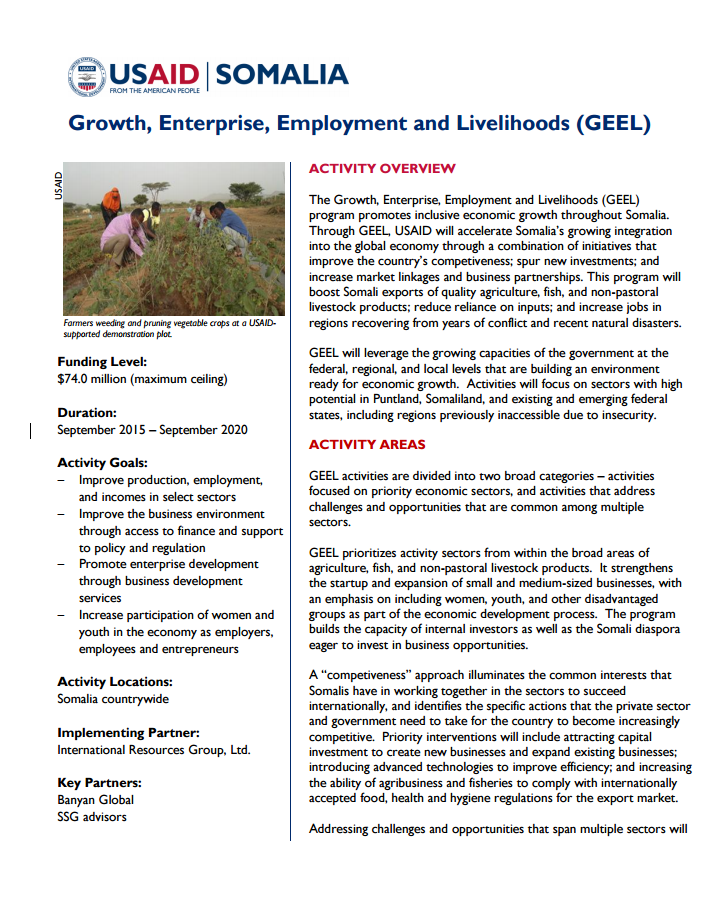![]() (3 MB) Economic Growth Activities
(3 MB) Economic Growth Activities
Growth, Enterprise, Employment and Livelihoods (GEEL)
ACTIVITY OVERVIEW
The Growth, Enterprise, Employment and Livelihoods (GEEL) program promotes inclusive economic growth throughout Somalia. Through GEEL, USAID accelerates Somalia’s growing integration into the global economy through a combination of initiatives that improve the country’s competitiveness; spur new investments; and increase market linkages and business partnerships. This program aims to boost Somali exports of quality agriculture and fish, increase dairy production, reduce reliance on inputs, and increase jobs in regions recovering from years of conflict and recurrent natural disasters.
GEEL is leveraging the growing capacities of the government at the federal, regional, and local levels that build foundations for an enabled environment for economic growth. Activities are focused on sectors with high potential across all regions in Somalia and Somaliland.
ACTIVITY AREAS
GEEL activities are divided into two broad categories – those focused on priority economic sectors, and those addressing challenges and opportunities that are common among multiple sectors.
GEEL prioritizes activity sectors from within the broad areas of agriculture, fisheries, and dairies. It strengthens the start-up and expansion of small and medium-sized businesses, emphasizing women, youth and other disadvantaged groups as part of the economic development process. The program builds the capacity of internal investors as well as the Somali diaspora eager to invest in business opportunities.
A ‘competitiveness’ approach illuminates the common interests that Somalis have in working together in the sectors to succeed internationally, and identifies the specific actions that the private sector and government need to take for the country to become increasingly competitive. Priority interventions include attracting capital investment to create new businesses and expand existing businesses; introducing advanced technologies to improve efficiency; and increasing the ability of agribusinesses and fisheries enterprises to comply with internationally accepted food, health and hygiene regulations for the export market.
Addressing challenges and opportunities that span multiple sectors reduces barriers to economic growth and promotes competition in Somalia’s economy, especially start-up firms, SMEs and women and youth-owned businesses. GEEL encourages players in the private sector to collaborate in new ways with each other and with federal and other government counterparts to maximize the opportunities available. GEEL is working with food processors, investors in boat-building, refrigeration and transport services, financial institutions and university faculties, to name a few. Activities include introducing efficient irrigation systems, pioneering export crops, constructing small-scale infrastructure projects like irrigation canals, access roads and fish landing-piers, and training technicians on solar and wind power technology.
ACTIVITY IMPACT
Somalia plays a substantial role in the global sesame trade. GEEL trained 489 sesame farmers on efficient agricultural practices, sound infrastructure and market linkages. Trainings are continuous and are currenly conducted on 35 demonstration plots, directly transferring skills and knowledge to the farmers. Some of the sesame has already been harvested, providing income for farmers and insight to successful sesame production for the next season.
Somalia is going through a unique and progressive transformation with immense trade opportunities to be leveraged. Somali business is at a turning point in terms of global trade, and GEEL ensured that Somali companies secured a space at the Gulfood Trade Fair. They displayed sesame, pulses, fresh fruit, dried lemon, frankincense and meat from Somalia; connected with potential traders, investors and industry peers; and capitalized on new trade opportunities. As a result, new sales of $2.7m were generated with additional anticipated sales of $1.6m. Their presence announced Somalia’s re-emergence in the global food market and built a bridge for future development and investment.
Somali waters are home to some of the richest fishing grounds in Africa, but illegal fishing is robbing the country’s economy of a source of revenue that could help boost coastal social and economic development, improve export earnings and create thousands of jobs. To address this issue, GEEL supported the Ministry of Fisheries and Marine Resources to join the Fish-i-Africa network, a collaboration of eight East African States fighting Illegal, Unreported and Unregulated (IUU) fishing in the region. As a direct result of this, Somalia, in collaboration with Kenya authorities, were able to arrest and fine an illegal trawler that has now ceased IUU activity in Somali waters.
Worsening drought conditions across Somalia and Somaliland have affected the availability of food and water in the country. With GEEL’s support, dairy livestock enterprises are importing animal feed for over 11,000 animals and facilitating the destocking of drought stricken livestock, where herds are sold off before starvation, generating over $1.5m in revenue and counting. These intervensions ensure that a market is created at a time where many have collapsed, and pastoralists have access to income to carry them through the drought.








Comment
Make a general inquiry or suggest an improvement.